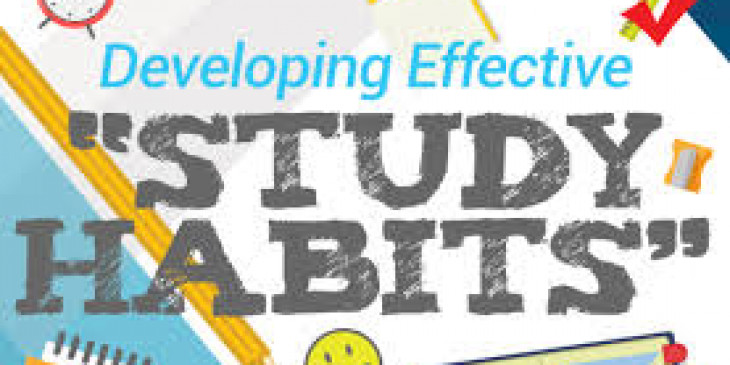STUDY HABITS
Learning Techniques
Time Management Judicious usage of available time by scheduling help to adjust study periods and extracurricular activities according to the need of a student.
Suggestions
Prepare and Follow “To Do List” - as a Daily/weekly planner to write important study activities. Do the same for monthly activities so that you can plan in advance.
Avoid Interruptions and Distractions - Learn to say ‘No’ according to your study plan to basic distractions e.g. internet, games mobile, TV etc.
Reading Speed - Generally, one reads 100 words per minute in mother tongue and 50-75 in any other language. As a habit, read few words; understand their meaning and usage on a daily basis.
Read Early in the Day when your mind is clear and sharp as your grasping is at its best.
Read in the Proper Position - Angling your reading material at 45 degrees improves reading speed and reduces eye strain. Avoid reading on a bed. Always prefer to sit on a chair.
Note taking
Suggestions
Paraphrase in own words, write key words and summarize to make personal notes.
The best effective order while taking notes is:
Listen ->Look- ->Think- -> Understand --> Paraphrase --> Make Notes
While reading, underlining important points and preparing notes is helpful.
Suggestions
You can boost your motivation in some of the following ways:
Set short-term goals and give yourself a reward when you achieve a target.
You should target for zero option for all subjects.
Find a source of inspiration: who or what could inspire you to complete your goals?
Positive self-talk like “I am going to prepare perfectly for this exam.” improves your motivation.
Subscribe to Self management one on one live lectures.
Memory Improvement
Some techniques to improve your memory-
Relax Your Mind – Being relaxed allows us to think clearly. Thus, we tend to perform effectively and efficiently. Under tension we struggle to remember information..
Use Your Body and Senses to Improve Your Memory - It has been said that people remember 90 percent of what they do, 75 percent of what they see and 20 percent of what they hear.
Mental Imagery - Use visualization by creating mental images that you can associate with the information you are trying to learn. The more visual you can make the learning process, the easier to remember the information.
Identify your Learning Style
Visual : Visual learning style involves the use of seen or observed things, including pictures, diagrams, demonstrations, displays, handouts, films, flip-chart, etc.
Auditory : Auditory learning style involves the transfer of information through listening: to the spoken word, of self or others, of sounds and noises.
Kinesthetic : Kinesthetic learning involves physical experience - touching, feeling, holding, doing, practical hands-on experiences. The word 'kinesthetic' describes the sense of using muscular movement - physical sense in other words.
Acronyms - Use of acronyms can be helpful when a list of facts or sequence of items must be remembered. Acronyms can be created to remember a specific item. For example, VIBGYOR to remember names of colours– violet, indigo, blue, green, yellow, orange and red.
SQ3R Technique –
Skim through the book : Note down headings, headings, outstanding features, such as figures, tables, and summary paragraphs.
Generate questions about the content of the reading. Purpose of this chapter? What is it about?
Read
Recite or Discuss with others
Review
Examination Techniques
Examinations need careful preparation, many feel nervous on the examination day but with careful revision and good examination techniques you can do well.
Suggestions: Before the exams-
Devote more time and attention towards weak areas
Even Under nervousness/ pressure never study the entire night before a paper. Mind gets clogged and you might forget what you knew nicely also.
Having a calm, cool and relaxed attitude towards examination is beneficial and can be gained only after good preparations.
Keep your Answer sheet neat as possible with :
keeping sufficient margin between answers & paragraphs
minimum cancellation on answers sheet
Never leave an exam hall early. You can utilise available time for checking and rechecking. There is always something you can do to improve your answer sheet.
Tips to success!!
Focus on one activity at a time - reading only; not reading while watching television.
Meditation, Yoga, simple breathing exercises improve concentration.
Avoid studying when attention is persistently wandering.
Avoid using excess of coffee or tea to improve concentration.
Stop daydreaming. Stand up and walk around to stop daydreaming.
Lastly, learn to enjoy study.
Summarizing…
- Plan smartly
- Study textbooks thoroughly
- Solve past year's question papers
- Stress on important points/formulae
- Time your answers
- Study in a group, once in a while
- Study early mornings
- Stress on weak subjects or parts
- Take care of your health
- Don't lose your peace by comparing with others
Parents Role during Exams
- Use the Magic Words : “Don’t worry, It’s just an Exam”
- Don’t give unnecessary stress to study long hours.
- Reward the student, if he scores good!!
- Make sure student is eating healthy and on time
- Avoid watching TV , inviting guests/relatives OR anything which could distract the student.
- Pick up and drop from Exam Centre


Leave a Comment
To post comment, please